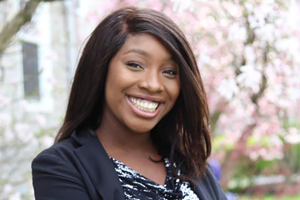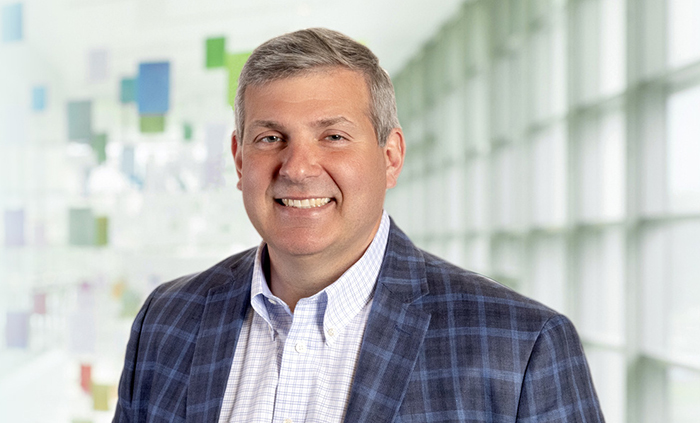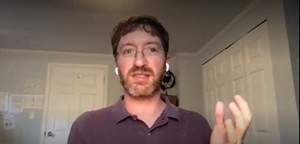Can a Liberal-Arts Education Give You an Edge in Tech?

Google, Microsoft and startup professionals weigh in
by MaryAlice Bitts-Jackson
What’s an optimal path to success in high tech? According to a multigenerational panel of tech pros at Google, Microsoft and in the startup sphere, it’s not what most people think.
The tech panel was just one of the many in-person and online career chats hosted by Dickinson throughout the current academic year. Free and open to all students of all majors, the events are hosted by the college's Advising, Internships & Career Center, recently honored by the Eastern Association of Colleges and Employers for serving the highest number of student participants in employer-information sessions..
The lunchtime tech discussion was moderated by Amy Nauiokas '94, a Dickinson trustee, founder and CEO of Anthemis Group and chair of Archer Grey. After discussing their careers, the experts took questions from students who are majoring in tech-related fields—including students enrolled in Dickinson's new and distinctive data-analytics program. They also offered advice for students specializing in other areas who wish to work as tech entrepreneurs or at tech companies as experts in business, marketing or sales.
Microsoft: Amara Anigbo ’20

Amara Anigbo ’20, the youngest panelist, was also the only one who majored in computer science. Although she originally envisioned a career in law, a philosophy class inspired her to investigate ethical issues in technology. She served an internship at Microsoft—an experience she highly recommends—and was hired right after graduation.
As a project manager at Microsoft, Anigbo partners with engineers and designers to solve problems and advance mixed-reality products. During the Zoom info session, she told students that her liberal-arts coursework, combined with her technological training, provided “an extra dimension,” compared to those with a traditional tech education.
“A liberal-arts education makes you a well-rounded individual who can explore problems from all angles and see the connections,” she said. “That’s important, because in tech you come across ambiguous situations that don’t have much clarity,” such as when developing products and services the world has never seen before.
And the opportunity knocks for tech-savvy liberal-arts students in any major, she added, explaining, "We’re moving into a space where every company is going to need people on staff with technical skills."
Google: Spyro Karetsos ’96, P’25

"I think a liberal-arts degree is very helpful in the tech sector, as well as in business and finance," said Spyro Karetsos '96, P'25. "That's especially true if you pair a soft skill with a hard skill through your major and minor."
Karetsos was a policy studies major with a minor in economics at Dickinson. After working for the Federal Reserve, he enjoyed a high-level career in financial services, including work as chief risk officer at some of the world's most influential financial organizations. And last year, after 25 years in that field, he joined Google as chief compliance officer. Karetsos said that the knowledge base, analysis and communications skills he gained at Dickinson have made it possible to shift gears midcareer and find success as a leader in an entirely different sector.
“At Google, we have a broad spectrum of products and clients, and we have to jump into challenging situations, determine the best course of action and identify alternatives and tradeoffs. And we do it every single day without a roadmap,” Karetsos said. “My liberal-arts education prepared me to be very analytical, dive deep, communicate clearly and learn quickly in new subject areas. I learned to bring tremendous insights and foresights into the company and build relationships.”
Tech entrepreneur: Jensen Gelfond ’08

Like Karetsos, Jensen Gelfond ’08 transitioned to tech after launching a career in a different field.
An environmental science major at Dickinson, Gelfond began working at a national, environmentally focused event company. He worked his way up to become the company’s IT manager, and noticed that employees who were resistant to, or fearful of, new technologies required specialized training.
Just four years after his college graduation, Gelfond founded a tech boutique company, Asheville Digital Lifestyle, to fill that need.
“It’s all about understanding technology and also understanding the people on the ground who use it,” he said. “When I think about a liberal-arts education, I think about being able to really pull in what I’ve learned about psychology, sociology and anthropology to be able to understand the mindset of the user, and where our traditional technological philosophies may be getting in the way of their success.”
TAKE THE NEXT STEPS
Published February 9, 2022